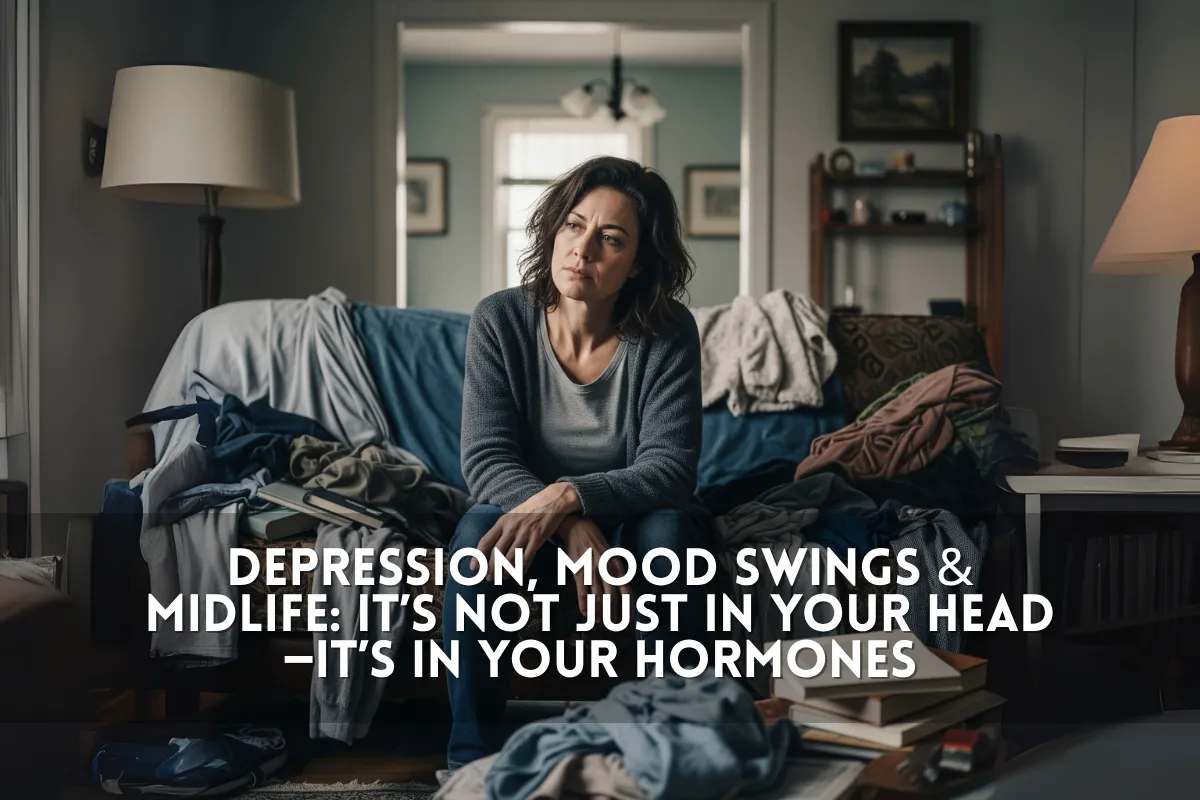
Depression, Mood Swings & Midlife: It’s Not Just in Your Head—It’s in Your Hormones
Depression, Mood Swings & Midlife: It’s Not Just in Your Head—It’s in Your Hormones
If you’ve been feeling more weepy, anxious, irritable—or just not like yourself—and someone’s brushed it off as “just getting older,” I’ve got news: you’re not broken. Your hormones are shifting.
Depression is real. It’s serious. But for millions of women 40+, it’s not just about brain chemistry—it’s about hormone chemistry. And if no one’s told you that? Well, let’s fix that right now.
Depression in Midlife Women: Way More Common Than You Think
Yes, depression is a clinical condition marked by persistent sadness, hopelessness, and a loss of interest in life. But here’s what’s missing from the typical narrative: your estrogen and progesterone levels directly impact your brain’s ability to regulate mood.
And during perimenopause (which can start in your late 30s or early 40s), those hormones are swinging wildly, eventually dropping off a cliff in menopause.
That hormonal rollercoaster? It’s messing with your serotonin, dopamine, GABA, and more—your emotional operating system.
Why Hormone Changes Trigger Depression
Let’s break it down:
Estrogen supports serotonin and dopamine—neurotransmitters that keep your mood stable, your motivation high, and your energy humming. When estrogen dips or fluctuates? That emotional stability disappears. You feel low, foggy, unmotivated, or anxious—and it often hits without warning.
Progesterone calms the brain by acting on GABA receptors. But when it crashes (as it does by your late 40s), you lose that calming effect. Cue anxiety, sleep disruption, and an internal “buzz” that won’t shut off.
Cortisol (your stress hormone) ramps up during hormonal transitions—throwing your brain into overdrive and making it even harder to cope with life’s demands.
If you’re crying at commercials, snapping at your partner, or lying awake at 3am running mental to-do lists—it’s not “you.” It’s your neurochemistry.
The Stats Don’t Lie
Women are 40% more likely to develop depression during perimenopause than before it
Over 80% of women report psychological symptoms—like sadness, anxiety, or irritability—around menopause
Hormone-related mood issues can triple your risk of a major depressive episode if not addressed early
This isn’t just stress or a bad week. This is biology.
Diagnosis: What’s Going On?
A typical depression diagnosis involves checking symptoms, ruling out other health conditions, and possibly running lab tests. But most providers don’t test your hormones—especially not in midlife. That’s where functional medicine steps in.
At Menrva, we take a hormone-first approach to mood changes:
✅ Full hormone panel: estrogen, progesterone, testosterone, cortisol, thyroid
✅ Neurotransmitter support
✅ Evaluation of sleep, stress load, nutrient status, and metabolic function
✅ A personalized roadmap that includes bioidentical hormone therapy (BHRT) if needed
Because here’s the truth: if your brain’s chemistry is off due to your body’s chemistry, we need to address both.
Treatment: BHRT + Brain Support = Mood Relief
Antidepressants can help—but they’re only part of the picture. For many women, BHRT is the missing piece that restores mood stability and gets you back to feeling like you again.
Bioidentical estrogen (estradiol) helps balance serotonin, reduce inflammation, and stabilize mood
Bioidentical progesterone calms the nervous system and improves sleep quality
Combined with therapy, lifestyle support, and targeted nutrients, BHRT creates the biochemical foundation your brain needs to function
And timing matters—the sooner you start, the better the outcomes. Waiting until years after menopause to start HRT isn’t as effective as starting during perimenopause.
Your Mood Matters—And You Deserve Real Solutions
If you’ve been feeling emotionally off, don’t ignore it—and don’t settle for band-aid fixes.
You’re not “just hormonal.” You’re in the middle of one of the most powerful neuroendocrine transitions of your life. And with the right support? You can feel steady, sharp, and whole again.
👉 Book your consult now at getmerva.com
👉 Let’s figure out if hormones are the root cause of your mood shifts—and get you back to thriving.


